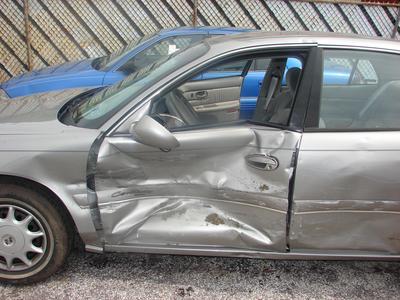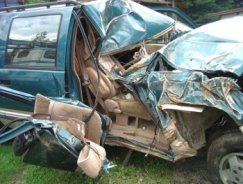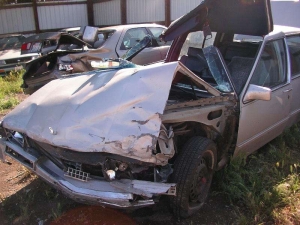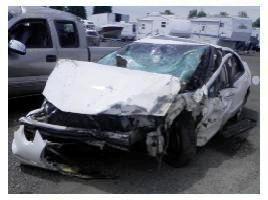Ask an Attorney a Question for FREE!
Vehicle Total Loss
The Adjuster's Evaluation
A vehicle total loss exists when the value to fix your car is more or very close to its actual market value (before the vehicle was totaled). You may be wondering how close the values can get. It depends on your state regulations and it also depends on the specific insurance carrier involved.
|
|
 Some companies will declare a vehicle a total loss if the dollar amount to fix the car reaches 70% of its fair market value. Others, however, will only do the same at 80%.
Some companies will declare a vehicle a total loss if the dollar amount to fix the car reaches 70% of its fair market value. Others, however, will only do the same at 80%.
Finding out exactly what your insurance company does in this situation is very important. Ask your adjuster what are the claim guidelines of that specific insurance company. Do not let them tell you that they do not handle that portion, or that they do not know much about total losses.
If they tell you this, then ask for an answer from someone who knows the exact correct answer. You will see that many adjusters start to paddle and try to not give you a straight answer. Do not allow for that. If necessary, ask them to please put it in writing (the fact that they do not know how they total a car).
You will not be trying to determine a dollar amount. You must be looking for a percentage of value. You need to know if the vehicle total loss threshold is 70%, 80%, or 90%.
You should get an answer to these questions once you know or think that you could have a vehicle total loss. Why? This number will help you do some reverse math regarding what the insurance company thinks your car is worth.
They will not tell you this information until they have an offer and are ready to cut off your rental. But by finding out a percentage, you could estimate what the insurance company is looking at.
There are, therefore, two (main) steps insurance companies need to follow when declaring a vehicle total loss.
1. They need to determine how much it will cost to fix the car.
2. They need to determine the Actual Cash Value of the car.
The first step will be done by the insurance adjuster directly. Insurance companies will not allow bodyshops to declare vehicle total losses. The reason for this is that bodyshops are in the business of fixing vehicles (this is true even for insurance “approved” shops).
If the there is a vehicle total loss, then that particular shop will not get business (by fixing your car), so there is an imminent conflict of interest.
This approach creates problems. When the damages are close to the total loss threshold (no one is sure if the car is or is not a total loss), the car will be towed to a repair facility for inspection.
An estimate will be written there and it will reveal to the insurance company if the car is a total loss or not; and if not, the dollar amount necessary to fix it.
If the car is determined to be a total loss or the values indicate that the dollar amount to fix the car is close to the total loss threshold, then an insurance adjuster has to come out and write another estimate to ensure that the car is indeed a total loss.
This process delays the time to have your car fixed or totaled. The vehicle ends up going through two inspections when in fact a total loss can be determined in only one (when an adjuster inspects the car).
Whatever the situation is, you must ask to see the insurance adjuster’s repair estimate. This is imperative to the way you will negotiate later on (if you want a better vehicle total loss settlement). You need to see this document even if they tell you that the car is a total loss and the adjuster estimate is only for repairs.
In some accidents, you do not need adjusters or repair facilities to tell you the car is a total loss. You can simply look at it and determine that there is no way your vehicle will ever be safe to drive again. There is, however, those gray areas where a vehicle could be a total but it could be also fixed.

Many people (myself included) question the ability of repair facilities to put vehicles in the same condition the car was in before a hard impact.
Frame damages, mechanical problems, safety issues, and some other things like these make you question the representations insurance companies make. They will have to put you back to the exact same spot you were in before the accident and the vehicle total loss.
In many circumstances, you do not want a vehicle fixed at all. Even if the value to fix the car is less than the total loss threshold (legally, the car is not a total loss), you know that the car will not be safe.
You also know that when you are going to sell this car, the value of your car will take a serious hit when buyers learn (through Carfax or similar reports) of how damaged this vehicle was in this incident.
If you want the insurance company to declare the vehicle a total loss, then you want the repair estimate to be high. You need to argue and persuade the adjuster that he/she is missing items. You also have to argue that the insurance company must allow money for “hidden “or supplemental damages. This eBook explores in detail the items and arguments that you should raise.
Look carefully at the labor hours the adjuster is quoting you. Call an independent bodyshop and make sure that these times are correct! Somtimes, the bodyshop wants to keep the car from being a vehicle total loss so they can fix it, so they make those estimates lower.
How much labor time does it take to fix the door? Adjusters that want to fix a car want to make the labor rate lower than it really is. They do this by lowering the labor time so they can allow the repair.
The second very important thing you should point out to the adjuster is the claim expense of fixing the car. If the car takes ten days to repair, then they will have to pay for ten days of rental.
Event though this is not quoted on the original estimate, it is an expense that the insurance company will incur. Insurance companies are in the business of making money, and if they declare the car a total loss, then they only have to pay three to four days for rental. If they fix the car, then they have to pay for the days the car is at the shop (whether the car is being fixed or not). It is a critical part of a vehicle total loss claim.
The rental bill alone can move an adjuster to total your car. If the estimate of the adjuster is low, and you believe that she is not taking into account all damages, then can ask for a teardown.
 A teardown occurs when the bodyshop (not the adjuster) takes apart the parts of the vehicle and looks under the damage to see if there are more things that needed to be fixed or replaced. Adjusters and bodyshop estimates are superficial and they only estimate what they can see without having to look under the damaged pieces. The hidden damage can be substantial and it needs to be accounted for.
A teardown occurs when the bodyshop (not the adjuster) takes apart the parts of the vehicle and looks under the damage to see if there are more things that needed to be fixed or replaced. Adjusters and bodyshop estimates are superficial and they only estimate what they can see without having to look under the damaged pieces. The hidden damage can be substantial and it needs to be accounted for.
Teardowns are not free and this is the reason insurance companies do not even mention that. Insurance adjusters must pay the bodyshop for this. This is the cost to handle and investigate the claim and it will not be counted against you. However, it is an expense they will be saving on if you do not ask for one. Personally, I believe that all vehicles need to have a teardown to determine if a car is repairable or not. Insurance companies should declare that there is not a vehicle total loss unless they really look at all damages.
Driving a car to a bodyshop and having the surface repaired without looking at all damages, including the ones that are “hidden”, is a bad policy and puts drivers at risk.
It is also important to show the adjuster that there are towing and storage charges that would be incurred if the car is fixed. The vehicle has to be stored while it is being painted, that is a cost that the insurance company must pay for. If the car has to be towed again, then that is another expense.
If the parts that your car needs must be shipped to the bodyshop, make sure the freight cost is included in that evaluation.
If you do not want your car to be a total loss and would rather have them fix it, then do not point out any of the cost factors outlined above. Sometimes vehicles are really okay after accidents, but they will total them because the value of the car is not very much. In this case, you might want them to fix it.
After looking at the repair estimate and making sure that it is accurate, the insurance company will determine the fair market value of your automobile.
What is the fair market value of it? Who determines that? And how is it determined? Don’t the insurance companies want the value to be low so they pay less?

The process of determining the actual cash value of your car is complex. Insurance companies know that they have a conflict of interest when this situation occurs. They have a duty to advocate and to protect their client (in many cases you), and at the same time, they must compensate you for your damages (the less they pay the better for the insurance company - their employer).
Insurance companies have a way to work around the issue. They can be sued in bad faith if they are settling total losses for less than they should, so they outsource the vehicle total loss value evaluation process to third party independent companies (i.e. CCC).
This way, they can claim that they are going to an independent company and that they are paying total losses per their numbers. They have no control on how these numbers come about.
Make sure you read other resources that help you negotiate your total loss claim.
|
For a Free Review of Your Case
Please Call (866) 878-2432 |


